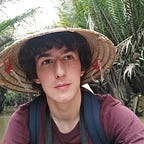Talking To Strangers In The Cradle Of Democracy
In september, with other youth fellows of the International Youth Think Tank, we joined the Athens Democracy Forum, an annual event organized by The New York Times in the greek capital. As a side event of the forum, we took to the streets of Athens, and talked to strangers about their idea of democracy.
We’ve been rejected a few times, but now we’ve found a restaurant that will lend us two chairs. It’s the kind of wooden chairs that Time has been sitting on for a while.
We’ve had to promise the owner that we will also get some dinner there later, of course.
The Plaza is crowded. There’s a flow of young and old walking down towards the Acropolis, and the orange sunlight makes life feels lighter.
There’s musicians at every corner. They are mostly turkish, playing the bouzouki under wide purple hats.
We drag the 2 heavy chairs to the centre of the Plaza. I sit on one, and put the other empty in front of me.
We hang our posters to the back of the chairs, and wait.
At first, I seem invisible in the crowd. Then, one mand with no hurry, asks me what’s this all about.
I tell him we’re from the International Youth Think Tank, taking part in the Athens Democracy Forum. We want to collect opinions about democracy from ordinary people like you. We already know what experts think.
His name’s Aleksandrinos. He’s athenian, a political science student, with an english level way above the greek average.
What is democracy for you? I ask him.
Democracy is power to the people. That’s what the greek word means. But for me, it’s also an illusion
Why so?
Because people are selfish. There will never be a real democracy as long as the people in power work only towards their interests.
I open my Moleskine and jot down some notes.
Do you feel free in this country?
Yes, I’m free to become whatever I want. But that’s a privilege. And you know, it’s not a fair race. We can all be free, but some rich people have a headstart, you can’t do much about it.
And do you feel like you have any power as a citizen?
Well yes. No, not as an individual. But if I get together with others, in groups our voice is louder. Power comes always from the collective.
In the span of 1 hour, we interviewed more than 20 people. Reflecting Athens’ multiethnic make-up, most of them were immigrants.
I talked with Syrians refugees, who said they couldn’t understand the meaning of the word “freedom” until they arrived in Europe. Back home, they had no choice but to obey, keep quiet and self-repress their discontent.
I talked with an Afghan expat, who expressed his desire to come back to his home country. He felt like he belonged there, but he sadly wouldn’t have any chance to move his family to Afghanistan again. “There’s no place I can call home anymore”, he concluded.
I learned to recognise and appreciate my privilege.
I learned that I’m extremely lucky to be able to do and say whatever I want, because most human beings are not.
Finally, I learned that many people are just waiting for a chance to be heard. It was surprisingly easy to get strangers to open up. All it took was a few chairs and an A3 poster.
Want to stay up-to-date with all the activities of the International Youth Think Tank? https://iythinktank.com/sign-up/
